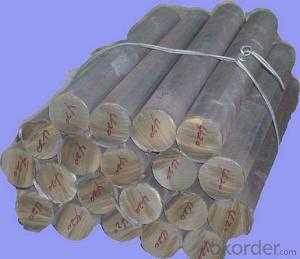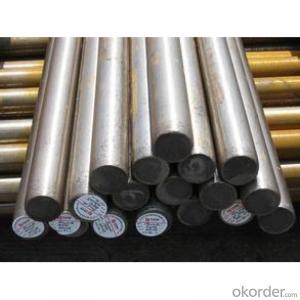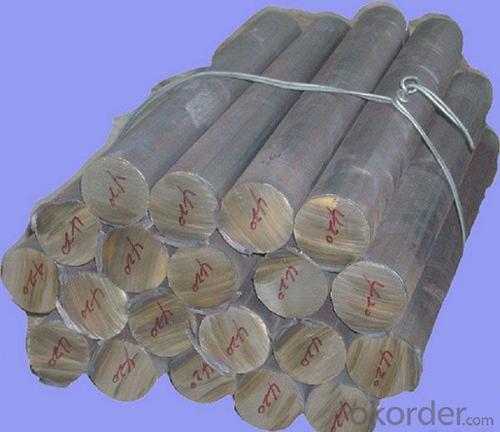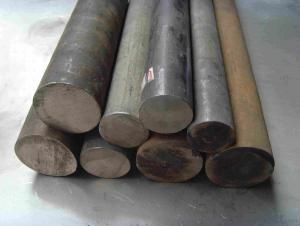Din 1.2510 Steel K460 Material Steel Plate
- Loading Port:
- China main port
- Payment Terms:
- TT OR LC
- Min Order Qty:
- 30 m.t.
- Supply Capability:
- 10000 m.t./month
OKorder Service Pledge
OKorder Financial Service
You Might Also Like
Specification
Din 1.2510 Steel K460 Material Steel Plate
Product information:
Specifications
MOQ:10MT
Delivery time:60days
Dimention:Dia 14-500mm
Steel Bar AISI O1, DIN 1.2510, GB 9CrWMn ,JIS SKS3
9CrWMn:Competitive price on a FOB basis
Cold Work Mould Steel
AISI O1,DIN 1.2510, GB 9CrWMn,JIS SKS3
1) Chemicial composition: C=0.85~0.95, Si=0.20~0.40, Mn=1.00~1.30, Cr=0.40~0.60, W=0.40~0.60, V=0.10~0.20.
2) Delivery condition: EAF or ESR, hot rolled or forged, black or machined surface, annealed, hardness: HBS≤228.
3)Usually specification:(customer requested size)
Thickness:20~500mm
Width:500~1200mm
Round Bar Size :50~500mm
Length:1000~6000mm
4) Application: used for making mini surface and shape complex cold punching moulds.
5)Payment terms:30% deposit,balance against LC at sight or TT
| Equivalent grades | GB | DIN | AISI | JIS | |||||
| 9CrWMn | 1.251 | O1 | SKS3 | ||||||
| Chemical Composition | C | Si | Mn | Cr | P | S | V | W | |
| 0.90-1.05 | 0.15-0.35 | 1.00-1.20 | 0.50-0.70 | 0.03MAX | 0.03MAX | 0.05-0.15 | 0.50-0.70 | ||
| Available size | Round Bar | Diameter | Length | ||||||
| 10-380mm | 2000-5800mm | ||||||||
| Flat Bar | Thickness | Width | Length | ||||||
| 12-500mm | 60-900mm | 2000-5800mm | |||||||
| Surface condition | Black surface/ Grinded/ Machined | ||||||||
| Annealed hardness | HB210MAX | ||||||||
| Characteristics | Din 1.2510 K460 hot rolled alloy steel plate | ||||||||
| High wear resistance | |||||||||
| High surface hardness after tempering; | |||||||||
| Good dimensional stability during heat treatment; | |||||||||
| Good machinability | |||||||||
| Applications | Din 1.2510 K460 hot rolled alloy steel plate | ||||||||
| Cutting and punching tools | |||||||||
| shear knives, thread rolling tools | |||||||||
| measuring instruments, platinum using molds | |||||||||
| Heat treatment | Hardening | ||||||||
| Harden from a temperature of 780-820oC followed by oil, warm bath (180-220oC) quenching. Hardness after quenching is 64 HRC. | |||||||||
| Tempering | |||||||||
| Tempering temperature: See the table bellow. | |||||||||
| Tempering Temperature (oC) vs. Hardness (HRC) | |||||||||
| 100°C | 200°C | 300°C | 400°C | 500°C | |||||
| 64 | 61 | 56 | 51 | 44 | |||||
Product show
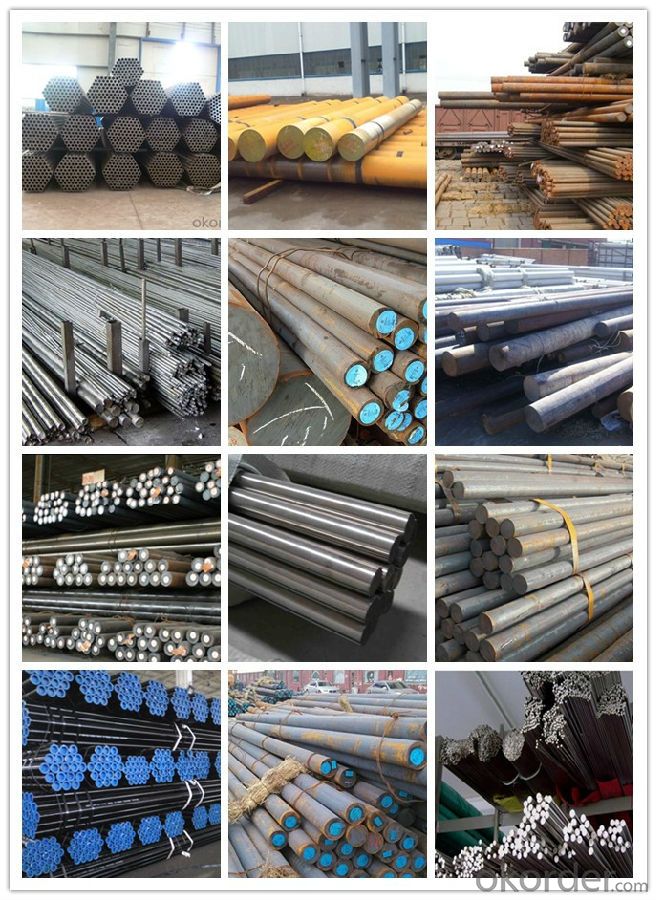
Workshop show
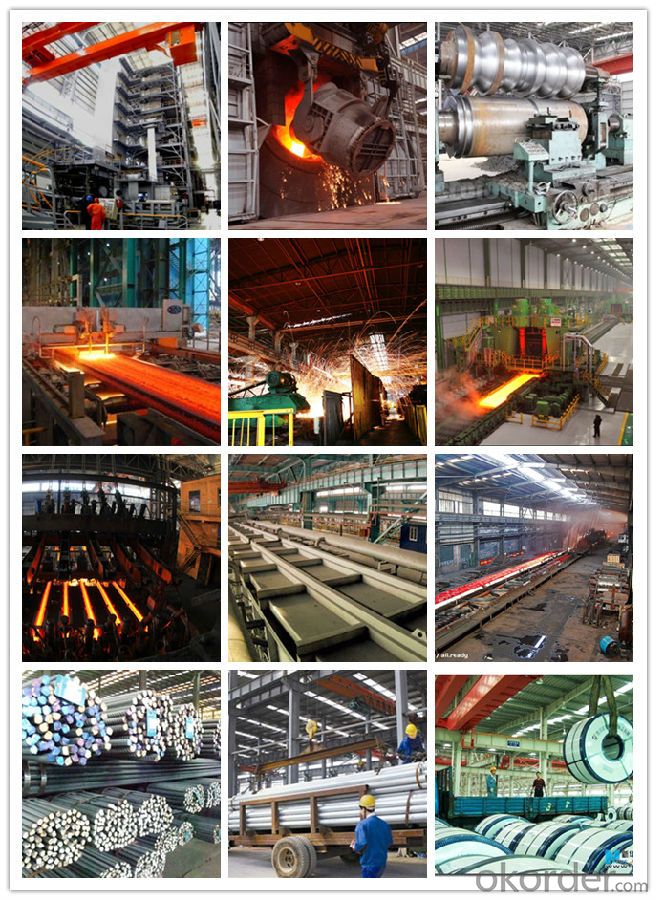
Our service:
-High manufacturing accuracy
-High strength
-Small inertia resistance
-Strong heat dissipation ability
-Good visual effect
-Reasonable price
Chose happens because of quality, then price, We can give you both.Additionally, we can also offer professional products inquiry, products knowledge train(for agents), smooth goods delivery, exellent customer solution proposals.Our service formula: good quality+good price+good service=customer's trust
SGS test is available, customer inspection before shipping is welcome, third party inspection is no problem.
If you need the sample, please feel free to let me know. Any question, we will contact you ASAP!
- Q: How does special steel contribute to the renewable energy industry?
- Special steel plays a crucial role in the renewable energy industry by providing the necessary strength, durability, and resistance to extreme conditions for various applications. It is used in wind turbines, solar panels, and hydroelectric infrastructure, enabling the efficient and reliable generation of renewable energy. Special steel also helps enhance the performance, efficiency, and lifespan of these renewable energy systems, ultimately contributing to the sustainability and growth of the industry.
- Q: What are the specific requirements for special steel used in the mining industry?
- Special steel used in the mining industry has specific requirements to ensure its durability, strength, and resistance to harsh conditions. Some of the key requirements for special steel used in the mining industry include: 1. High strength: Special steel used in the mining industry must have high tensile strength to withstand heavy loads and resist deformation under extreme conditions. This enables the steel to endure the pressure, impact, and stress that it may encounter during mining operations. 2. Wear resistance: Mining environments involve abrasive materials, such as rocks and ores, which can cause significant wear on equipment. Special steel used in the mining industry needs to have excellent wear resistance to prevent premature failure and increase the lifespan of mining equipment. 3. Corrosion resistance: Mining operations often take place in highly corrosive environments, such as underground mines or near water bodies. Special steel used in the mining industry should possess high corrosion resistance to withstand exposure to chemicals, moisture, and other corrosive agents. This helps prevent rusting, pitting, and other forms of corrosion that can weaken the steel. 4. Toughness: Mining equipment is subjected to heavy impacts and vibrations, which can lead to fractures if the steel is not tough enough. Special steel used in the mining industry should exhibit excellent toughness, allowing it to absorb energy from impacts and vibrations without fracturing. This ensures the safety and reliability of mining equipment. 5. Heat resistance: Mining operations involve high-temperature environments, such as smelting and refining processes. Special steel used in the mining industry must have good heat resistance to withstand the elevated temperatures without losing its strength or undergoing deformation. 6. Machinability: Special steel used in the mining industry should also have good machinability, allowing it to be easily formed into complex shapes or structures. This facilitates the manufacturing process of mining equipment and components. Overall, the specific requirements for special steel used in the mining industry revolve around strength, wear resistance, corrosion resistance, toughness, heat resistance, and machinability. Meeting these requirements is crucial for ensuring the reliability, durability, and safety of mining equipment in the demanding mining environments.
- Q: What are the applications of special steel in the railway industry?
- Special steel has a wide range of applications in the railway industry. It is commonly used in the manufacturing of rails, which need to be durable and able to withstand heavy loads and constant wear and tear. Special steel is also used in the construction of railway bridges and tunnels, as it offers high strength and resistance to corrosion. Additionally, special steel is used in the production of various railway components such as wheels, axles, and couplers, ensuring safety and reliability in train operation.
- Q: Can special steel be used for making mining equipment?
- Yes, special steel can be used for making mining equipment. Special steel refers to steel alloys that have been specifically designed and manufactured to possess certain properties and characteristics that make them suitable for specific applications. In the case of mining equipment, special steel is often used due to its exceptional strength, toughness, and resistance to wear and corrosion. Mining equipment is subjected to extreme conditions, such as heavy loads, impact, abrasion, and exposure to harsh environments. Special steel grades, such as high-strength low-alloy (HSLA) steel, tool steel, and wear-resistant steel, are commonly employed in the manufacturing of mining equipment to ensure their durability and performance under these demanding circumstances. Special steel allows mining equipment to withstand the stresses and strains encountered during excavation, hauling, and processing of minerals. It can be used for the fabrication of components like bucket teeth, drill bits, cutting edges, and crusher parts, which need to resist wear and maintain their strength even when exposed to abrasive materials. Moreover, certain types of special steel, such as stainless steel, are particularly suitable for mining operations where equipment comes into contact with corrosive substances like acids or moisture. Stainless steel exhibits excellent corrosion resistance, making it suitable for applications such as pipes, tanks, and conveyors used in mining operations. In conclusion, special steel can indeed be used for making mining equipment. Its superior strength, toughness, wear resistance, and corrosion resistance make it a preferred choice for manufacturing various components and structures used in the mining industry.
- Q: What are the main characteristics of electrical steel forgings?
- Electrical applications greatly benefit from the numerous advantageous features possessed by electrical steel forgings. Firstly, their low core loss property minimizes energy loss as heat during the magnetic cycle, making them exceptionally suitable for devices like transformers, motors, and generators. Consequently, the overall efficiency and performance of these devices are significantly enhanced. Secondly, electrical steel forgings exhibit high magnetic permeability, enabling them to conduct magnetic flux with ease. This attribute facilitates effective magnetic induction and maximizes the strength of the magnetic field in electrical components. As a result, energy conversion and transmission are efficiently achieved. Moreover, electrical steel forgings possess low coercivity, indicating that they require minimal magnetic field strength for magnetization and demagnetization. This characteristic results in quicker and more precise magnetic switching in electrical devices, leading to improved performance and reduced energy losses. Additionally, electrical steel forgings possess high electrical resistivity, which effectively restricts the flow of electrical current and diminishes energy losses due to eddy currents. This attribute is particularly vital in applications where electrical steel forgings are subjected to rapidly changing magnetic fields, such as in power transformers. Lastly, to further enhance their electrical performance and prevent short circuits or electrical leakage, electrical steel forgings are often treated with surface insulation coatings or coatings with high electrical resistivity. In conclusion, electrical steel forgings offer a range of essential characteristics including low core loss, high magnetic permeability, low coercivity, high electrical resistivity, and the ability to be coated for insulation. These properties make them indispensable in various electrical applications, ensuring efficient energy conversion, reduced losses, and reliable performance.
- Q: How is alloy steel used in the production of gears and shafts?
- Alloy steel is commonly used in the production of gears and shafts due to its high strength, durability, and resistance to wear and fatigue. The addition of various alloying elements, such as chromium, nickel, and molybdenum, enhances the material's mechanical properties, making it suitable for heavy-duty applications. Alloy steel gears and shafts can withstand high loads, transmit torque efficiently, and provide reliable performance, ensuring smooth operation and prolonged lifespan in various industries, including automotive, aerospace, and manufacturing.
- Q: How does special steel perform in impact loading conditions?
- Special steel is known for its exceptional toughness and strength, making it highly effective in impact loading conditions. It can withstand high levels of force and absorb energy, resulting in minimal deformation or damage. This makes special steel a reliable choice for applications where impact resistance is crucial, such as in construction, automotive, and aerospace industries.
- Q: What are the properties of nitriding steel?
- Nitriding steel is a process in which the surface of the steel is hardened and enhanced by introducing nitrogen into its structure. The properties of nitriding steel include increased surface hardness, improved wear resistance, enhanced fatigue strength, and greater corrosion resistance. Additionally, nitriding steel exhibits a low coefficient of friction, excellent dimensional stability, and increased resistance to heat and oxidation.
- Q: How is special steel used in the medical manufacturing process?
- Special steel is used in the medical manufacturing process for a variety of applications, including the production of surgical instruments, implants, and medical devices. The unique properties of special steel, such as its corrosion resistance, biocompatibility, and strength, make it ideal for creating high-quality and durable medical products. Additionally, special steel can be easily sterilized, ensuring the safety and hygiene of medical equipment.
- Q: How does special steel contribute to the defense industry?
- Special steel contributes to the defense industry in various ways. Its exceptional strength, durability, and resistance to extreme conditions make it a crucial material for manufacturing components used in military vehicles, aircraft, and naval vessels. Special steel is also used in the production of armor plates and ballistic protection systems, providing enhanced protection to soldiers and military equipment. Additionally, its corrosion resistance properties make it ideal for constructing submarines, missiles, and other critical defense infrastructure. In summary, special steel plays a vital role in ensuring the reliability, performance, and safety of defense equipment, making it an indispensable asset for the defense industry.
Send your message to us
Din 1.2510 Steel K460 Material Steel Plate
- Loading Port:
- China main port
- Payment Terms:
- TT OR LC
- Min Order Qty:
- 30 m.t.
- Supply Capability:
- 10000 m.t./month
OKorder Service Pledge
OKorder Financial Service
Similar products
Hot products
Hot Searches
Related keywords
